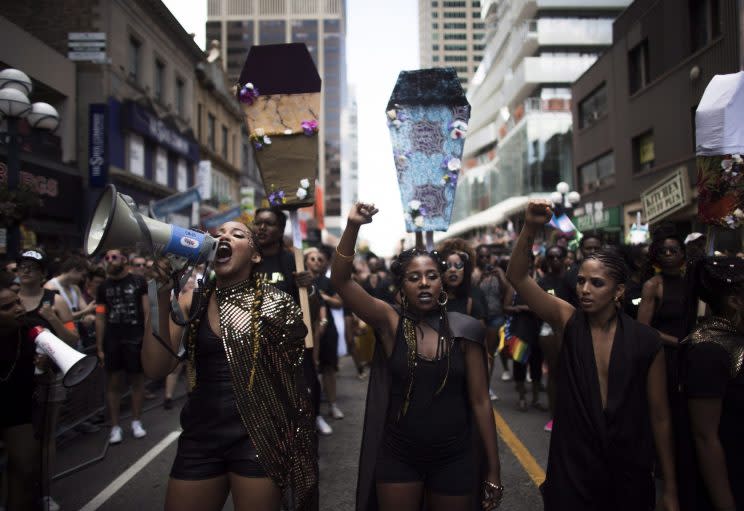Police and pride: how Black Lives Matter changed the conversation across Canada

Months after Black Lives Matter stopped Toronto’s Pride parade to demand changes to the annual festival, Pride Toronto organizers have officially signed off on the demands, including a ban on police floats.
Though how exactly the plan will be implemented is still unknown (and a Toronto police spokesperson told The Canadian Press he was unwilling to comment until the terms are clearer), the move reignites a fierce debate that raged in regional Pride organizations and police forces across the country.
What work, if any, needs to be done to build relationships between LGBTQ communities and law enforcement?
On the other side of the country, Pride Vancouver is continuing its talks with BLM members and the Vancouver Police Department (VPD), but some moves have already been made.
“After what happened in Toronto, we had discussions. And they had discomfort with the armoured police vehicle that was in the parade, so we got rid of it,” Kieran Burgess of Vancouver Pride told Yahoo Canada News.
Police in uniform (complete with guns) and about four other police cars march in the city’s parade (usually held mid-summer) under the banner of Vancouver City Services.
“We’re having discussions in February with the VPD and Black Lives Matter about cutting back those cars and about the uniformed presence,” he said.
In October, the Pride organization held a community consultation to air grievances and give suggestions.
“We discovered that we needed to do more outreach to all the different communities, so they can feel welcome,” said Burgess. Some of those people included Rainbow Refugees and a queer Indigenous woman who wanted to start her own group.
“We gave her a bursary, as well as to others, so she could create her own group or do research.”
Pride Vancouver also discovered that some groups wanted to participate in the parade but the $120 fee was too much for them. So, it’s inviting some of them to join for free in 2017.
In terms of the people running the organization, Burgess points out that the board has people of colour, trans people and those who are female and male.
“What happened in Toronto last year with Black Lives Matter was a wake up call,” admitted Burgess. “We know we are not perfect and we’re open to dialogue … we want to better address the needs of everyone in our community.”
‘A chance to reflect’
Over at Pride Montreal, vice-president Jean-Sébastien Boudreault told Yahoo Canada News that his city simply “has a different climate” and there was little fallout from what happened in Toronto.
“We are so much smaller. In Toronto they have nine stages, we only have one,” said Boudreault about Pride Montreal, which usually runs mid-August for seven days. Last year’s tally amounted 2.2 million visitors — a jump from 2013 when it was only 465,000.
“It did give us a chance to reflect and think about what else we could do to avoid what happened at Toronto’s parade.”
Every year, the organization meets with the community. In early November, they created a meeting with people of colour and invited different groups to talk to the organization.
“We hired two outreach coordinators as a result of that meeting,” said Boudreault. “We wanted to only hire one but found two outstanding individuals — one is a young, black queer person and the other is a Lebanese trans woman.”
As it were, Boudreault says the organization does have trans people and people of colour on its board along with a split gender-wise of those working in the office. And in 2017, they will add a second stage to feature events and performances from diverse members of the community.
In all of its 34 years, the parade has never included police, so that hasn’t been an issue.
“We just want everybody to come together and respect one another and feel welcome,” said Boudreault, who added that Montreal Pride 2017 promises to be bigger — with the inclusion of a major LGBTQ conference on human rights running for three days and a Francophone-focused LGBTQ conference on Aug. 18.
Halifax
Members of the board at Halifax Pride released a statement to Yahoo Canada News about the Toronto decision, stating that they didn’t know how it would affect their festival at this time.
“Our cities have different histories, experience, communities, and police forces. We must recognize the history of the relationship between pride movements and law enforcement, while ensuring we create a festival that meets the unique needs of our community in Halifax,” read the release.
The statement continued to say that the board at Halifax Pride continues to meet with senior management at Halifax Regional Police to “foster a dialogue around what police participation in pride events will look like.”
There was no other comment addressing issues of minority participation.


